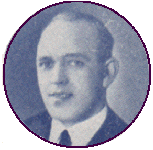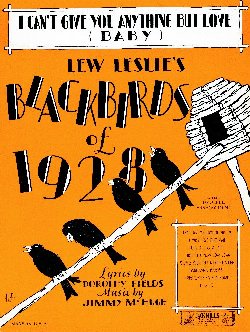 |
 |
Copyright© 2001 Thomas L. Morgan
| Pictures | Movie Songs | Other Songs |
 |
 |
| Pictures | Movie Songs | Other Songs |
One of the greatest and most prolific songwriters from the Twenties through the Fifties was Jimmy McHugh. McHugh wrote for all areas of popular music, including melodies for The Cotton Club, Broadway and Hollywood musicals. McHugh's musical collaborators reads like a Who's Who of songsters. Besides his early partner Dorothy Fields, McHugh also collaborated with Johnny Mercer, Frank Loesser, Jerome Kern, Ted Koehler, Gus Kahn and Harold Adamson.
Jimmy McHugh was born in Boston, Massachusetts on July 10, 1895. His father was a plumber and his mother an accomplished pianist. He worked with his father before deciding that his real love was songwriting.
While attending Staley College in Boston, Jimmy got a job with the Boston
Opera House. He first worked as an office boy and later, as the talented piano
player's reputation grew, he was promoted to rehearsal pianist for the company.
In 1917, he left to find work in the field of popular music. Eventually he found
a job as a pianist and song plugger with the Boston office of Irving Berlin's
publishing company.

During the years 1922 to 1930, McHugh contributed songs to nine different
Cotton Club shows, three Revues, and expanded his career by writing his first
song My Dream of the Big Parade, for a movie entitled The Big
Parade. McHugh also continued to write for the popular music market
including a song written upon the death of Rudolph Valentino.("There's A New
Star In Heaven To-Night")
In 1927, McHugh's career took a fortunate turn when he met his future partner, Dorothy Fields. Fields, age 22, was the daughter of veteran vaudeville star and producer, Lew Fields and had previously been working as a school teacher. McHugh and Fields seemed to have a good working relationship, with Dorothy supplying the lyrics and McHugh the music.

The team soon became two of America's most celebrated songwriters when they collaborated on the score of "Blackbirds of 1928." This landmark all-black musical, was put together by white entrepreneur Lew Leslie, who had success with earlier "Blackbird" shows that had been performed in London and Paris. The star studded musical became a Broadway hit and had a run of 518 perfomances in a little over a year, a record at that time for an all-black show. Some of the songs from that musical were I Can't Give You Anything But Love, Diga Diga Do, and I Must Have That Man.
In the early Thirties, McHugh and Fields brought their song writing skills to Hollywood. After a few years on the West Coast, Dorothy decided she liked the Broadway scene better than Hollywood and returned to New York. McHugh was soon collaborating with many other Hollywood tunesmiths including Ted Koehler, Johnny Mercer and Frank Loesser.
In 1936, McHugh teamed with Harold Adamson. In the next fifteen years, he would write more movie songs with Adamson than with any other collaborator. Most of the movies they wrote for were minor pictures but that didn't stop them from turning out such gems as I Love To Whistle, I Couldn't Sleep A Wink Last Night,and (This Is) A Lovely Way To Spend An Evening. There was also a string of songs from this period that would certainly fit into the Novelty Hall of Fame including Post Office (I've got to be kissed), The Bad Humor Man, and Heil Heel Hitler. McHugh made a guest appearance as himself in The Helen Morgan Story (1957), which featured many of his songs.
Jimmy McHugh died in Beverly Hills in 1969. During his lifetime he had written over 279 songs. He never won an Academy Award despite being nominated five times, but he left a legacy of wonderful songs that testify to his skill as one of America's great songwriters.
 |
|
 |
|
| |||
|
|
|
| |
|
| |||
|
|
|
| |